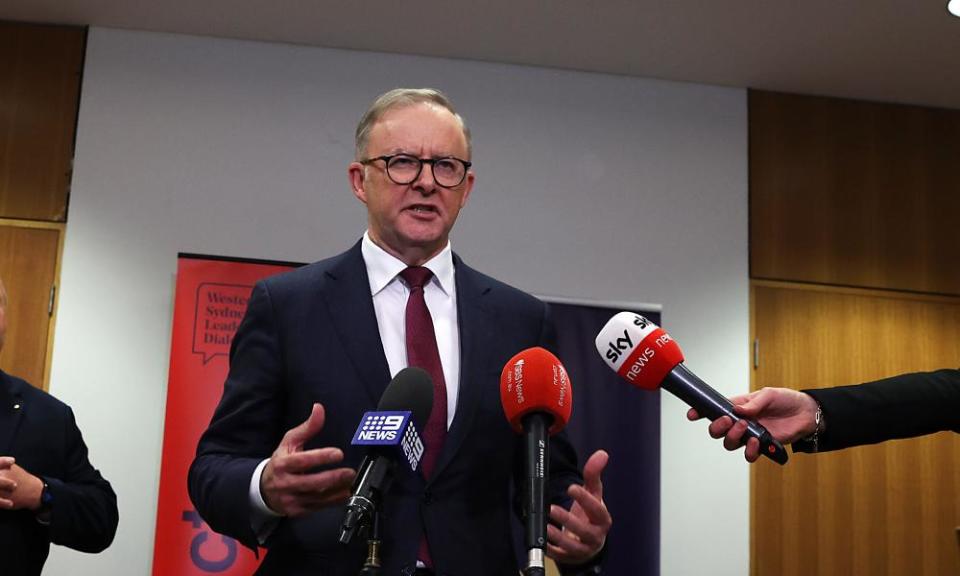Anthony Albanese leaves open possibility of changes to stage-three tax cuts

Anthony Albanese has left open the prospect of amending the stage-three tax cuts, raising concerns over the “increasingly uncertain global economic outlook” in his first public comments since his government resumed publicly discussing the legislated tax changes this week.
The prime minister rebuffed criticism from the Coalition that he had “gone missing” in recent days, after a relatively quiet public schedule.
“Advanced economies are seeing the steepest and most synchronised global monetary policy tightening in decades,” Albanese told the Western Sydney Leadership Dialogue on Friday.
“This only reinforces how important it is for fiscal policy to complement that monetary policy, so as not to provide an incentive for monetary policy to be even more contractionary.”
The Labor government went to the May election promising to honour the last phase of the tax changes legislated under the former government, which are due to come in from 2024. The stage-three changes will reduce taxes for those earning above $45,000, but will overwhelmingly benefit those on high incomes, and will cost the budget $243bn over 10 years.
Related: Liberal moderate Bridget Archer says Labor right to be questioning stage-three tax cuts
The government has come under pressure from the crossbench and some economists to pare back the more generous provisions but Albanese and the treasurer, Jim Chalmers, have repeatedly said the government’s position has not changed.
But this week Chalmers made clear the tax cuts are under review amid a worsening economic outlook, with mixed views within the Labor caucus on how to proceed.
Albanese has not held a press conference since last Friday, and in that time has only given one FM radio interview – in which he was not asked about news matters. At a short press conference following his speech on Friday, he again said the government “hasn’t changed our position” but did not rule out doing so in future.
“We’ll continue to get on with making sure that we deliver a budget that is responsible, that acknowledges the pressures that are on,” Albanese said.
Asked if he could guarantee no changes to the stage-three tax cuts, the prime minister said: “What I have said is that the government has not changed our position.”
In his speech, Albanese spoke of the need for fiscal policy to work in tandem with the monetary policy of Reserve Bank interest rates, and for public spending not to fuel inflation. He later rebuffed suggestions that his rhetoric was in the context of changing tax policy, but said this thinking was feeding into budget deliberations.
“That is me being economically literate, and what we know is that there is enormous pressure on the global economy,” he said.
“One of the things that I said today was that the global central banks are all acting in a simultaneous way for the fastest and highest tightening of monetary policy that we have seen in decades.”
The deputy Liberal leader, Sussan Ley, said on Friday the prime minister had “gone into hiding”.
“Where is he? He’s not fronting the Australian people and explaining what’s going on here,” she told 5AA radio.
Albanese this week hosted the Solomon Islands prime minister, Manasseh Sogavare, in Canberra and posted on social media about meeting representatives of the Australian Academy of Science. The government’s expenditure review committee (ERC) has also been meeting ahead of this month’s federal budget.
“I’ve been out and about this week. This weekend I’ll be in Western Australia. I’m here in western Sydney today,” Albanese said.
In a speech in Brisbane on Friday, Chalmers said the ERC had met for 14 hours over the previous three days in Canberra. He will travel to Washington next week for a meeting of the G20 finance ministers.
“The hard truth is that these global economic storm clouds are darkening, not clearing. The risk of major economy downturns is rising, not receding,” Chalmers said.
“The impact this has on Australia’s economy and budget is hardening, not softening.”
He also spoke of the need “not to misalign fiscal and monetary policy”, noting his first federal budget would include “difficult decisions for difficult times, the right calls for the right reasons”.

 Yahoo Movies
Yahoo Movies 